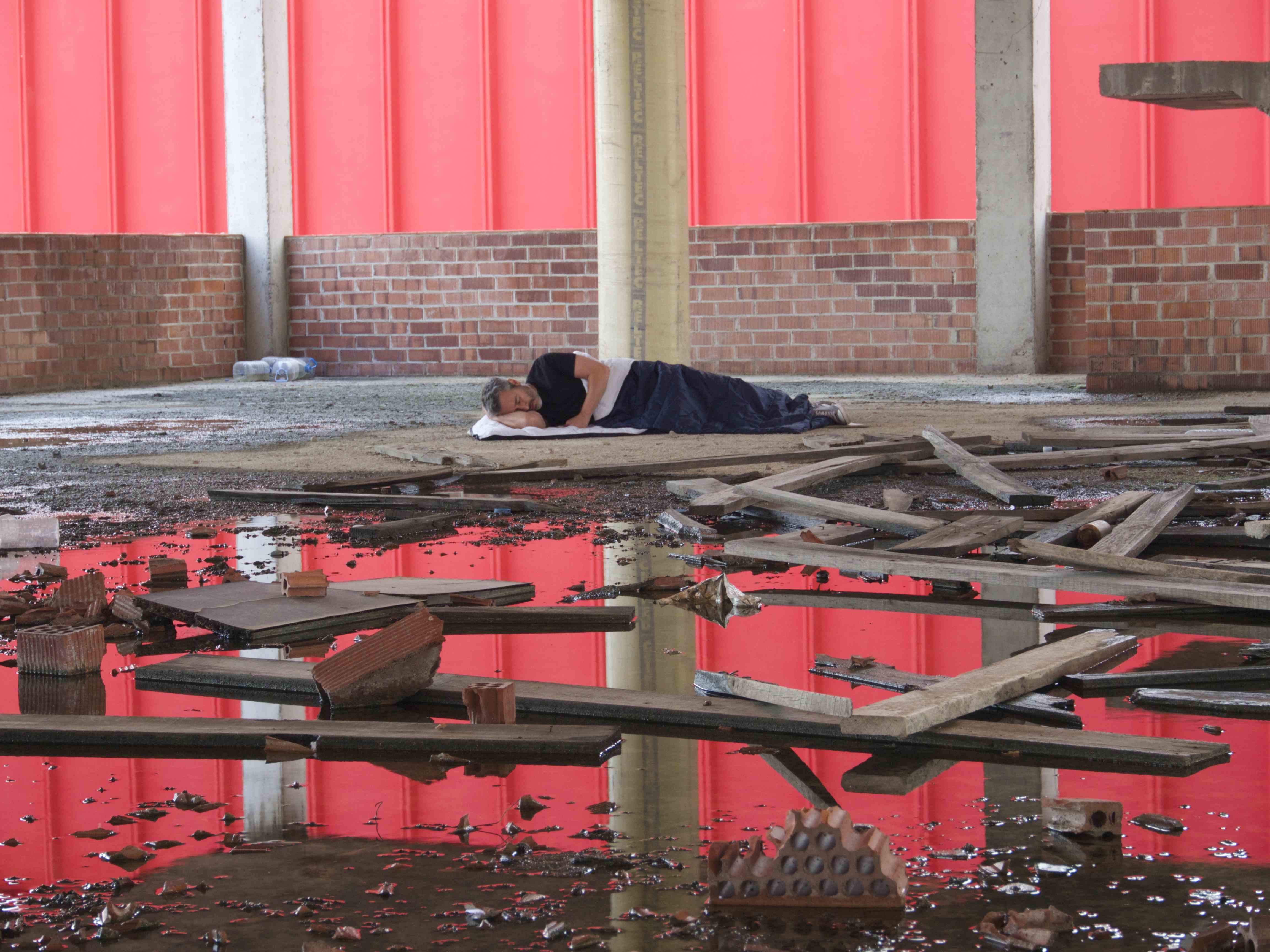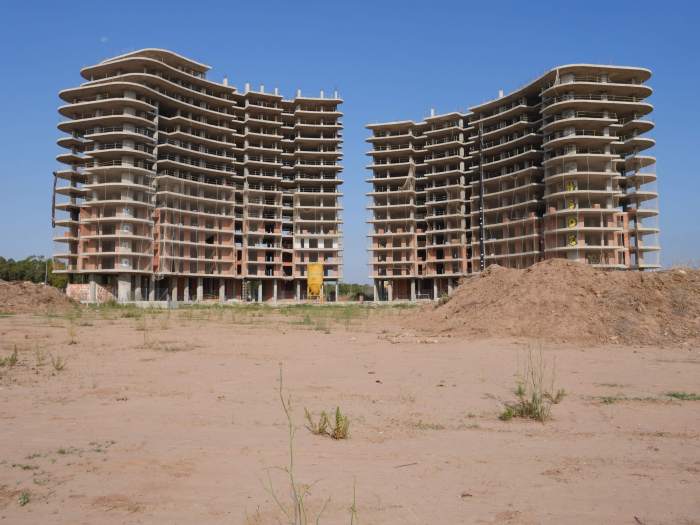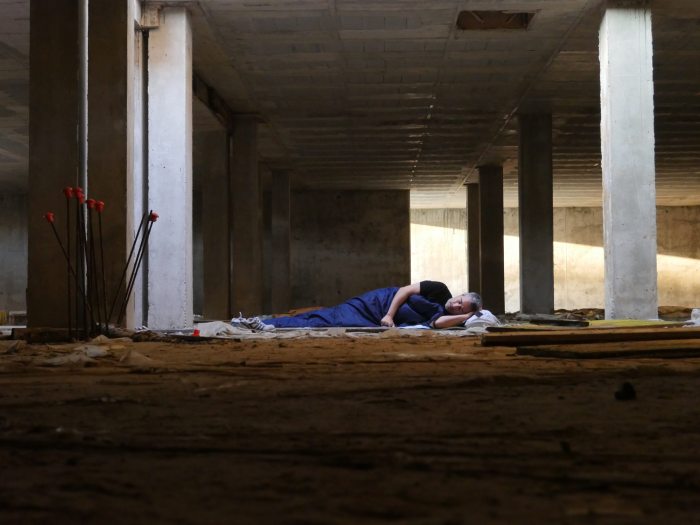by Melissa Garcia Lamarca
The bust of Spain’s real estate boom has left 3.4 million empty housing units across the country. By ‘inhabiting’ empty or unfinished housing units, Agustín Ortiz Herrera’s Empty Living project underlines the contradictions and consequences of the housing boom and the frustrations generated by its failure.
Over seven years ago, Spain’s real estate boom busted, a boom that the long-time environmental activist and critical thinker Ramón Fernández Durán termed the urbanisation tsunami. The facts from this period of real estate monoculture spanning from 1997-2007 are dizzying: almost seven million units of housing built, twelve million mortgages granted, over 2.5 million construction workers employed and a quarter of the Spanish territory built up. Many boasted that Spain was the European leader in cement consumption and in fifth place globally after China, India, the US and Japan, during a moment of unprecedented economic growth.
This cement was the concrete representation of the growth of the urban accumulation of capital in the form of housing, offices and infrastructure that appeared to be endless. The pressure to buy housing in particular came from all sides, from public as well as private actors, even one’s family, neighbours and friends. It was nearly a deeply held societal belief that prices would never fall and that housing was a safe investment. If Spain’s first falangist Minister of Housing Jose Luís Arrese were present, he would have been thrilled that his project, starting at the end of the 1950s to create “a country of homeowners, not proletariats”, was truly becoming a reality.
In fact, the construction orgy was made possible because of this ideology in the first place. Put into practice it led to the liberalisation of banking legislation in 1981 and the land law in 1997, and the creation of a legal framework to extend the financing of housing beyond bank savings in 1992. All these changes served a housing policy that was more concerned with stimulating economic activity than any social good or social policy. When Spain joined the Eurozone and adopted the Euro, foreign capital finally found solid ground and an unprecedented quantity of credit flowed into the country like water from the tap. Contracting a mortgage came to be almost as easy as buying bread. Until the bubble burst in 2008.
Now, almost seven years later many millions of people continue without jobs and with little possibilities of finding decent ones, despite announcements from the Spanish government and International Monetary Fund touting Spain’s recovery and job growth. For those with work, job precarity is the norm. Due to this combination of unemployment and precarity we continue to witness a savage series of rental and mortgaged-home evictions – whose execution is paid and carried out by the state – forcing a significant proportion of the population having to live from family solidarity, charity or exploitative schemes by organised gangs. And that’s not including the heart-breaking reality of those who take their own lives before facing eviction. But many people are also fighting against evictions and the hellish abuse by banks with the Platform for Mortgage Affected People (PAH), demonstrating the therapeutic value of collective processes with their motto, “yes we can” (sí se puede).
Meanwhile, there are 3.4 million empty housing units across Spain, at least a third of which are in the hands of financial entities or in Europe’s largest real estate agency, SAREB. Standing for the ‘Management Company for Assets Arising from the Banking Sector Reorganisation’, it was created to remove “toxic assets” from the balance sheets of the savings banks rescued by the state. Added to all the empty houses, many constructions remain for ever half-built, due to the sudden bankruptcy of developers and construction firms. Their owners prefer to keep houses empty or constructions half-built until the real estate market improves and prices rise again. Despite being an entity that is 45% publicly owned, SAREB’s stated objective is to “divest assets in 15 years, maximising their value.”
The Empty Living project by Agustín Ortiz Herrera signals the fundamental contradictions and consequences of the model that led to the real estate bubble. Last summer he wandered across Spain with no roadmap, stopping in those places particularly affected by the crisis, finding himself amid unfinished housing where it was impossible to live. The idea was to inhabit these abandoned spaces, to find a place to rest and spend a few hours, even spend the night if possible. But in reality the chosen spaces are not adequate for this activity, as the environments are hostile, unsafe, decayed and absurd. The human presence itself in these abandoned places then becomes a contradiction in itself. The same empty spaces are forgotten presences eerily mutated into metaphors of defeat. These constructions which once raised expectations of a more prosperous future now have become a symbol of the failure of the system and of the frustration that this crisis still generates.
His photographs and diary, which are worth a careful look through here, are an example of art and activism projects whose objectives are to make more visible and to make us reflect on a reality that may seem distant, or that we have not though of before. What we can do to counteract the process of financial capital behind the urbanisation tsunami and its consequences is perhaps not clear to us, but upon reflection with the help of projects like Empty Living and struggling with social movements like the PAH, new ideas and alternatives for a better future can emerge.
* This article was originally published in Diagonal, in Spanish on 25 November 2014.








